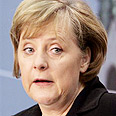
These ties are evident in the supply of additional submarines to the Israeli Navy, decided on by the former cabinet as its final act in office (coordinated with the incumbent government); renewal of the Israel-German fund for scientific research and development; not to mention the many youth exchange programs, sister-city agreements and developed economic ties.
The historic perspective of this impossible cooperation – from the negotiations on reparation funds, munitions supplies and covert armament initiatives to cooperation between the German and Israeli secret services – provides plenty of fuel for legends and myths. Yet despite this, something in this so-called idyllic relationship is coming to a screeching halt.
Firstly, it appears that the gap between the declarations of friendship sounded by the elites in both countries and the general population's attitude towards Israel is widening.
According to a public opinion poll, half of the German population compares Israel's attitude towards the Palestinians to Germany's attitude towards the Jews. The polls point to a growing trend that is already widespread in German media reports and commentaries.
This position, which presents a secondary anti-Semitic approach, adds the dimension of relativity to Germany's historic guilt, applying it to Israel in presenting it as representative of all Jews.
This perception ties in with Germany's appeasing foreign policy towards open anti-Semitism by various regimes, and a disproportionate exposure to anti-Zionist Israelis and Jews in the media and public discourse.
Double standard
In parallel, during the years of the Oslo Accords, the Palestinians entered several fields of important cooperation between Germany and Israel, with Israel's blessing. Yet while Israel's call on the Palestinians to change their ways wasn't taken into account by Germany, and Germany couldn't withdraw its aid to the autonomic authority – the German government imposed sanctions on Israel during a military operation against Palestinian terrorists in 2002.
Often the declarations made by German politicians, who seek to save Israel from itself, sound entertaining. But they are concerning when those very same politicians draw up plans for dispatching German soldiers to make peace in the embattled Middle East. The double standards of these politicians were exposed in the international forces dispatched to Lebanon that prevent Israel from defending itself, while Germany is unable to guarantee our security.
Due to the ongoing tensions in the Middle East, the voices in Germany calling to end the special ties with Israel will inevitably grow. In wake of this pressure, and the change of generations, the special ties between Germany and Israel would only survive if responsible decision-makers find new ways to link national interests with ethical perspectives and an historic outlook.
Dr. Yves Pallade is the author of: Germany and Israel in the 1990s and Beyond: Still a “Special Relationship”?















